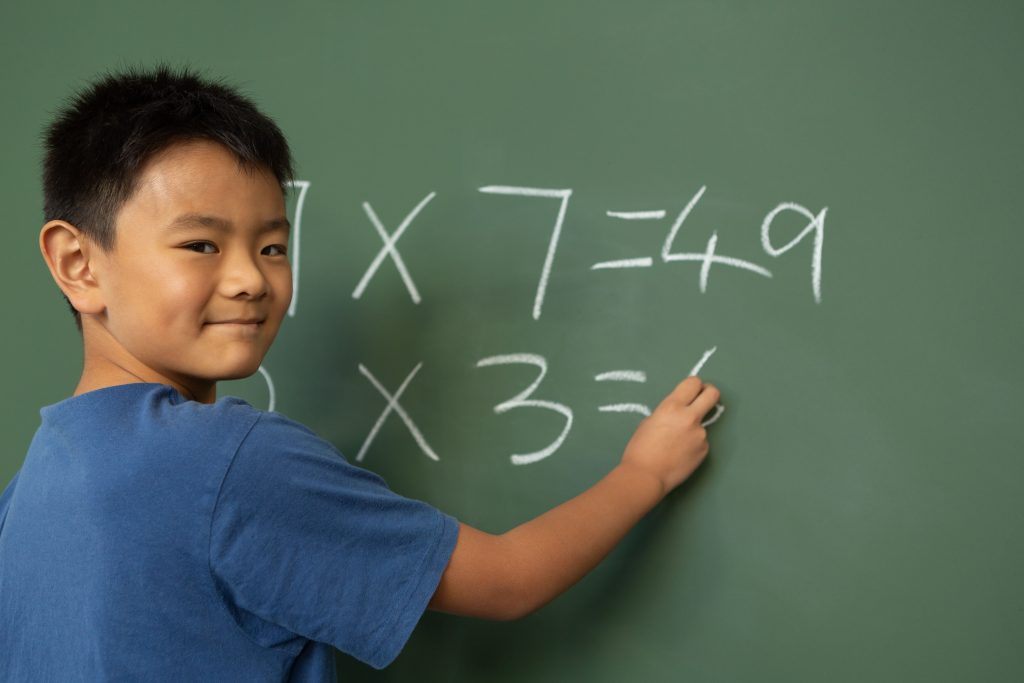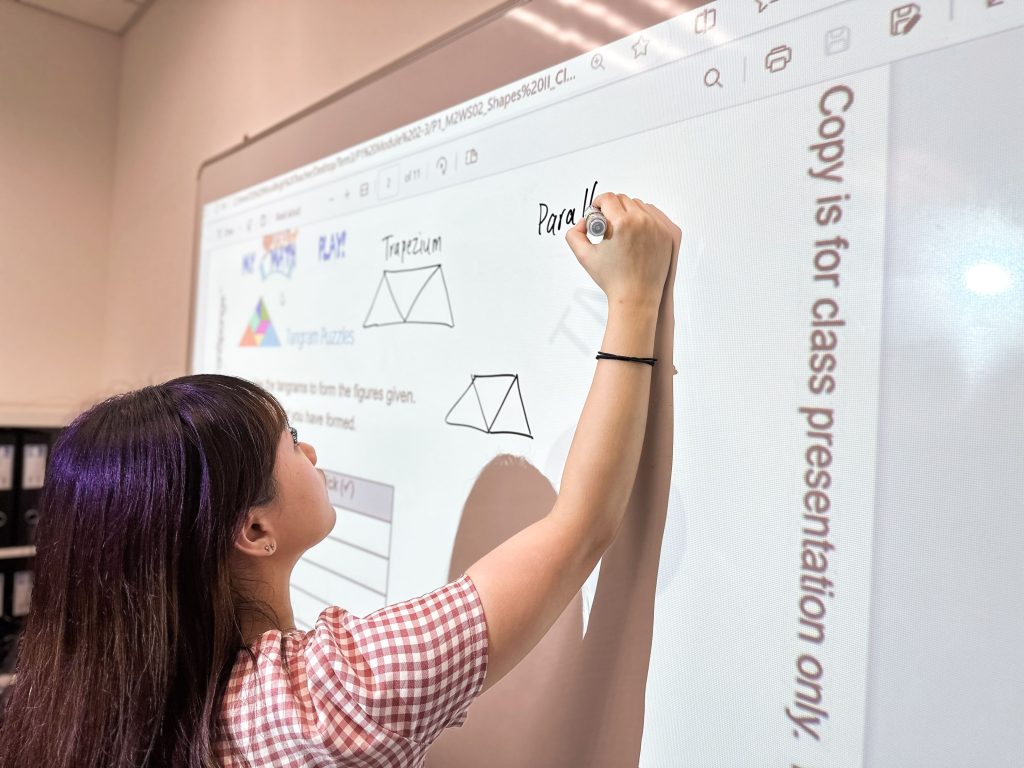Establishing a strong foundation in math in primary school is important for a student’s self-confidence, critical thinking abilities, and overall success in academic life.
When students grasp key mathematical concepts early, they will find it easier to tackle more complex problems as they grow up. They will also be more likely to enjoy learning math and approach the subject with a positive attitude.
This article explores effective strategies to help students master primary school math in Singapore, from understanding key concepts to practising regularly and getting extra support when needed.

1. Understand Core Math Concepts
Primary school is when students lay the groundwork for essential concepts in mathematics, such as addition, subtraction, multiplication, division, and number sense.
Grasping basic arithmetic operations during primary school is important for students as they progress to increasingly advanced math topics. Having trouble with division or multiplication in one year can significantly impact their ability to keep up with the next academic year’s syllabus.
However, math concepts on a page can seem abstract and distant to some primary school children. To strengthen a student’s foundation in basic concepts, you can consider using the following math learning techniques:
Hands-on Learning Tools
Use visual aids and objects to help build students’ understanding of arithmetic. Primary school students can physically manipulate objects to see the mechanics of adding and subtracting, helping them better understand these operations. Some examples of hands-on tools include:
- Dice or dominoes
- Colourful blocks or tiles
- Counting frames
- Number lines
Activities and Exercises
Additionally, incorporating engaging activities can help primary school students solidify their conceptual understanding of basic math topics:
- Sorting and Classifying
Students can sort objects by size, shape, or colour to reinforce categorisation skills. For example, you can cut large geometric shapes out of paper, cut those in half, and distribute them among students. Ask them to go around the class to find the matching pieces to their assigned shape.
- Math Scavenger Hunt
Give students a list of math-related questions, puzzles, or challenges that require them to search the school grounds for answers.
- “Becoming” the Equation
Create large card labels representing numbers and the signs for addition, subtraction, multiplication, and division. Assign the cards to your students and divide them into groups. Have each group arrange themselves in the correct order to form a logical equation.
2. Build Problem-Solving Skills
Problem-solving in math is a vital skill for primary school students. Learning how to approach word problems, understanding what the question is asking, and identifying which operations to apply are all part of effective problem-solving in mathematics.
To refine their problem-solving abilities, encourage students to break down math questions into smaller, manageable steps:
- Read and Understand the Problem
Teach students to identify important information within the question, and ask them to summarise the core problem in their own words. Let them read through the question several times if necessary for better comprehension.
- Identify Keywords
Most math word problems contain key phrases that indicate the operations required to solve them. For instance, “in total” suggests addition, while “difference” indicates subtraction. Training primary school students to recognise these words enhances their ability to arrive at the right solutions.
- Use Visual Aids
Diagrams, charts, or even doodles can help students organise their thoughts effectively. Encourage them to draw out the word problem or use physical objects like blocks to work out the answers.
- Get Together in Groups
Have students get together in small groups and discuss how they arrived at a particular answer. Learning from peers can boost understanding and confidence in math.
- Explore Games and Puzzles
Additionally, various games and puzzles can promote logical reasoning and analytical thinking in primary school math students.
Consider the following word puzzle:
“Five people were eating apples, A finished before B, but behind C. D finished before E, but behind B. What was the finishing order?”
This question challenges a student to apply reasoning, sequencing, and critical thinking skills.
Other examples of problem-solving games and activities include:
- Crosswords or word searches
- Jigsaw puzzles
- Sudoku
- Chess or checkers
3. Encourage Practice and Repetition
No matter your age, improving math skills requires regular practice to strengthen understanding and increase problem-solving accuracy.
By practising different operations and topics in math, primary school students will enhance their learning retention and reduce their likelihood of forgetting essential math principles.
Regular practice also challenges primary school students to keep refining their approach across a broad range of math problems, helping them cultivate patience and persistence in learning.
Some math practice methods for primary school students include:
- Timed Quizzes
Timed exercises help students learn to work under pressure, relying on quick mental calculations and efficient time management.
Structured worksheets and math exercise books provide problems with progressive difficulty levels to reinforce various math concepts.
Remember to give your students plenty of positive reinforcement. Praise their progress, give small rewards for certain milestones, and acknowledge their efforts in practising mathematics.
4. Integrate Real-Life Applications
Research shows that students understand math better when their teachers and parents make practical connections to daily life.
Rather than memorising a set of formulae, students will be able to relate mathematical problems to concrete examples in their own lives, helping them better retain what they’ve learned. This real-world approach also makes mathematics more interesting and meaningful for students.
Here are some real-world math activities parents can try:
- Shopping: Calculate discounts, compare item prices, and count change.
- Cooking: Measure ingredients and adjust recipes for larger or smaller servings to reinforce fractions and multiplication concepts.
- Time Management: Learn to tell time, calculate the time it takes to travel from one place to another, and schedule daily activities to better understand time-related math concepts.
- Household Budgeting: Basic budgeting and saving principles to build their financial literacy.
5. Utilise Math Tuition and Resources
Math tuition and tutoring can be tremendously helpful for primary school students who need additional, structured support in their math learning journey.
Tuition programmes, like the ones offered at Oodles Learning help to address learning gaps, reinforce specific math concepts, and provide opportunities for advanced learning.

Empowering Children to Excel in Primary School Math
Building a strong foundation in primary school math requires the mastery of core concepts, strong problem-solving skills, consistent practice, real-life application, and the smart use of available resources.
By providing the right forms of support and creating engaging learning experiences, parents and educators can help students not only strengthen their essential math skills, but also develop a lasting interest in the subject.
At Oodles Learning, we specialise in helping students build a strong math foundation through engaging lessons, proven strategies, and a supportive environment.
If you’re looking for expert guidance to boost your child’s confidence and performance in math, we are here for you!
Visit Oodles Learning’s website to explore our PopsicleMath, +hinkingMath and PaceUP tuition programme, learn about our teaching methodologies, and find a centre near you in Singapore.
For more tips, resources, and updates, follow Oodles Learning on Instagram, Facebook, or contact us directly through our website.


